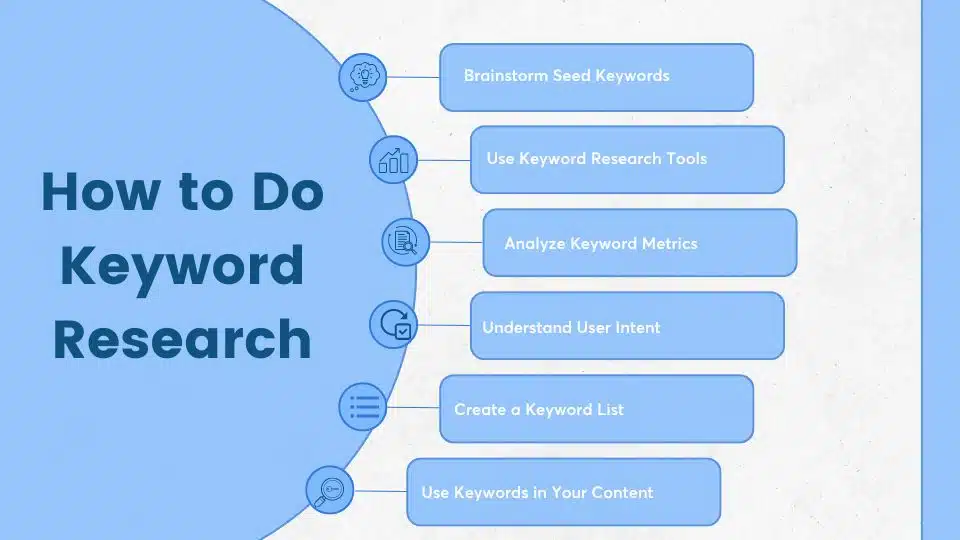Keyword research plays a crucial role in today’s competitive digital landscape, where ranking on Google is not just about creating content — it’s about creating the right content. At the heart of every winning SEO strategy lies this essential process. Whether you’re a blogger, digital marketer, entrepreneur, or SEO specialist, understanding keyword research can be the game-changer for your online visibility.

In this blog, we’ll explore:
- What keyword research actually is
- Why it matters in SEO
- How to do it effectively
- Tools to help you
- Real-world examples
- Common mistakes to avoid
Let’s dive in!
🧠 What is Keyword Research?
Keyword research is the process of finding and analyzing the search terms that people enter into search engines like Google, Bing, or YouTube. The goal is to identify words and phrases (keywords) that your target audience uses — so you can create content that answers their questions or solves their problems.
Imagine this: You own a bakery in Delhi. Wouldn’t it be helpful to know that people often search for “eggless cakes near me” or “custom birthday cakes in Lajpat Nagar”? That’s keyword research in action — knowing what your audience is already looking for.
💡 Why is Keyword Research Important?
1. 🚀 Drives Targeted Traffic
When you use the right keywords in your content, you attract the right audience — people who are already searching for what you offer.
2. 📈 Improves Search Engine Rankings
Search engines like Google use keywords to understand your content. Well-optimized content ranks higher, increasing your organic visibility.
3. 🎯 Helps You Understand User Intent
Keyword research gives insights into what your audience wants. For example:
- “Buy running shoes” = transactional intent
- “Best running shoes 2025” = commercial/informational intent
- “How to clean running shoes” = informational intent
By matching your content to user intent, you boost engagement and conversions.
4. 💰 Saves Time and Money
Instead of creating random content that may not perform, keyword research lets you focus on content that has proven demand.

🔍 Types of Keywords
Understanding different types of keywords is crucial for proper research:
| Type | Example | Purpose |
|---|---|---|
| Short-tail keywords | “Digital Marketing” | Broad and high competition |
| Long-tail keywords | “Best digital marketing course for beginners” | Specific, lower competition |
| Branded keywords | “Nike running shoes” | Brand-focused |
| Geo-targeted keywords | “Bakery in South Delhi” | Local SEO |
| LSI Keywords | “online marketing, web marketing” | Related terms that support content |
🛠️ How to Do Keyword Research (Step-by-Step)
Step 1: Understand Your Niche
Start by knowing:
- Who your target audience is
- What they are searching for
- Their pain points, questions, and needs
You can even check Quora, Reddit, YouTube comments, or Facebook groups for real-life queries.
Step 2: Brainstorm Seed Keywords
Seed keywords are broad terms related to your business. For example:
- Niche: Fitness
- Seed Keywords: “home workout”, “weight loss tips”, “gym diet”
Step 3: Use Keyword Research Tools
Here are some excellent tools:
- Free Tools: Google Keyword Planner, Ubersuggest, AnswerThePublic, Google Trends
- Paid Tools: SEMrush, Ahrefs, Moz, LongTailPro
These tools help you find:
- Search volume
- Competition level
- CPC (Cost per Click)
- Keyword difficulty
- Related questions
Step 4: Analyze Keyword Metrics
When choosing a keyword, look for:
- Search Volume: Number of times the keyword is searched monthly
- Competition / Difficulty: Lower difficulty is easier to rank
- Relevance: Is it aligned with your content?
- User Intent: Informational, Navigational, Transactional
Step 5: Choose the Right Mix
Don’t only target high-volume keywords — they’re competitive. Instead, mix:
- High-volume + Medium-volume + Long-tail
- Informational + Commercial intent keywords
Step 6: Organize Keywords into Clusters
Group related keywords together. For example:
Main Keyword: Digital Marketing
Clusters:
- “What is digital marketing”
- “Types of digital marketing”
- “Digital marketing course in India”
- “Career in digital marketing”
You can create one pillar page with these supporting blogs as internal links.

📋 Real-World Example
Let’s say you run a food blog and want to write about pasta.
Seed Keyword: Pasta recipes
Using Ubersuggest or Google Keyword Planner, you find:
- “Easy pasta recipes” – 27,000 searches/month
- “White sauce pasta recipe” – 14,000
- “Healthy pasta recipes” – 5,000
- “Pasta for kids” – 2,000
Instead of just writing “Pasta Recipe,” you create:
- Main article: “10 Easy Pasta Recipes Anyone Can Cook”
- Supporting blogs:
- “How to Make White Sauce Pasta Step by Step”
- “5 Healthy Pasta Recipes Under 30 Minutes”
- “Kid-Friendly Pasta Recipes for School Lunch”
That’s strategic content creation based on keyword research.
🔧 Best Tools for Keyword Research (Free & Paid)
✅ Free Tools
- Google Keyword Planner – Basic keyword data, search volume
- Ubersuggest – Keyword ideas, difficulty score, content suggestions
- AnswerThePublic – Great for question-based keywords
- Google Trends – To track seasonal keywords
💰 Paid Tools
- SEMrush – Comprehensive SEO suite
- Ahrefs – Deep analysis, keyword gap, backlinks
- Moz Keyword Explorer – SEO insights with easy UX
- Surfer SEO – On-page optimization with keyword targeting
⚠️ Common Keyword Research Mistakes
- ❌ Targeting Keywords Without Intent
Don’t just go by volume — always understand why someone is searching that term. - ❌ Ignoring Long-Tail Keywords
These are less competitive and easier to rank, especially for new websites. - ❌ Using the Same Keyword Too Often (Keyword Stuffing)
It hurts SEO and user experience. Use variations naturally. - ❌ Not Updating Keyword Strategy Regularly
Trends change, so refresh your keywords every few months. - ❌ Focusing Only on One Channel
Different platforms = different search behaviors. What works on Google might not on YouTube or Instagram.
📊 Keyword Research in Different Platforms
| Platform | User Behavior | Example Keywords |
|---|---|---|
| Questions, problems, how-to | “How to bake cake without oven” | |
| YouTube | Visual learners, tutorials | “Cake recipe video” |
| Hashtags, trends, visual content | “#cakereels #bakingtutorial” | |
| Amazon | Product-based search | “Best cake baking kit” |
| DIY, tutorials, aesthetic-related | “Easy cake decoration ideas” |
So adapt your keyword research based on your target platform.

🧭 Pro Tips to Get Ahead
- Use Google Auto-Suggest to find what people are searching in real time
- Use “People Also Ask” section for blog topics
- Use Competitor’s Blogs to find keyword gaps
- Focus on Answering Specific Questions — these rank in featured snippets
- Keep a keyword research spreadsheet to plan your content calendar
🏁 Conclusion: Is Keyword Research Worth Your Time?
Absolutely! Keyword research is not just an SEO technique — it’s the foundation of any successful digital marketing campaign. It helps you understand your audience, meet their needs, and position your content right where it matters — on the first page of search results.
Whether you’re building a blog, an e-commerce site, a YouTube channel, or running paid ads, keyword research ensures your content gets seen by the right people at the right time.
So the next time you sit down to write a blog or shoot a video, don’t start with your idea — start with what your audience is searching for. That’s the real secret to digital growth.
In today’s competitive digital landscape, ranking on Google is not just about creating content — it’s about creating the right content. At the heart of this strategy lies a vital process called keyword research. Whether you’re a blogger, digital marketer, entrepreneur, or SEO specialist, understanding keyword research can be the game-changer for your online visibility.
In this blog, we’ll explore:
- What keyword research actually is
- Why it matters in SEO
- How to do it effectively
- Tools to help you
- Real-world examples
- Common mistakes to avoid
Let’s dive in!
🧠 What is Keyword Research?
Keyword research is the process of finding and analyzing the search terms that people enter into search engines like Google, Bing, or YouTube. The goal is to identify words and phrases (keywords) that your target audience uses — so you can create content that answers their questions or solves their problems.
Imagine this: You own a bakery in Delhi. Wouldn’t it be helpful to know that people often search for “eggless cakes near me” or “custom birthday cakes in Lajpat Nagar”? That’s keyword research in action — knowing what your audience is already looking for.
💡 Why is Keyword Research Important?
1. 🚀 Drives Targeted Traffic
When you use the right keywords in your content, you attract the right audience — people who are already searching for what you offer.
2. 📈 Improves Search Engine Rankings
Search engines like Google use keywords to understand your content. Well-optimized content ranks higher, increasing your organic visibility.
3. 🎯 Helps You Understand User Intent
Keyword research gives insights into what your audience wants. For example:
- “Buy running shoes” = transactional intent
- “Best running shoes 2025” = commercial/informational intent
- “How to clean running shoes” = informational intent
By matching your content to user intent, you boost engagement and conversions.
4. 💰 Saves Time and Money
Instead of creating random content that may not perform, keyword research lets you focus on content that has proven demand.
🔍 Types of Keywords
Understanding different types of keywords is crucial for proper research:
| Type | Example | Purpose |
|---|---|---|
| Short-tail keywords | “Digital Marketing” | Broad and high competition |
| Long-tail keywords | “Best digital marketing course for beginners” | Specific, lower competition |
| Branded keywords | “Nike running shoes” | Brand-focused |
| Geo-targeted keywords | “Bakery in South Delhi” | Local SEO |
| LSI Keywords | “online marketing, web marketing” | Related terms that support content |
🛠️ How to Do Keyword Research (Step-by-Step)
Step 1: Understand Your Niche
Start by knowing:
- Who your target audience is
- What they are searching for
- Their pain points, questions, and needs
You can even check Quora, Reddit, YouTube comments, or Facebook groups for real-life queries.
Step 2: Brainstorm Seed Keywords
Seed keywords are broad terms related to your business. For example:
- Niche: Fitness
- Seed Keywords: “home workout”, “weight loss tips”, “gym diet”
Step 3: Use Keyword Research Tools
Here are some excellent tools:
- Free Tools: Google Keyword Planner, Ubersuggest, AnswerThePublic, Google Trends
- Paid Tools: SEMrush, Ahrefs, Moz, LongTailPro
These tools help you find:
- Search volume
- Competition level
- CPC (Cost per Click)
- Keyword difficulty
- Related questions
Step 4: Analyze Keyword Metrics
When choosing a keyword, look for:
- Search Volume: Number of times the keyword is searched monthly
- Competition / Difficulty: Lower difficulty is easier to rank
- Relevance: Is it aligned with your content?
- User Intent: Informational, Navigational, Transactional
Step 5: Choose the Right Mix
Don’t only target high-volume keywords — they’re competitive. Instead, mix:
- High-volume + Medium-volume + Long-tail
- Informational + Commercial intent keywords
Step 6: Organize Keywords into Clusters
Group related keywords together. For example:
Main Keyword: Digital Marketing
Clusters:
- “What is digital marketing”
- “Types of digital marketing”
- “Digital marketing course in India”
- “Career in digital marketing”
You can create one pillar page with these supporting blogs as internal links.
📋 Real-World Example
Let’s say you run a food blog and want to write about pasta.
Seed Keyword: Pasta recipes
Using Ubersuggest or Google Keyword Planner, you find:
- “Easy pasta recipes” – 27,000 searches/month
- “White sauce pasta recipe” – 14,000
- “Healthy pasta recipes” – 5,000
- “Pasta for kids” – 2,000
Instead of just writing “Pasta Recipe,” you create:
- Main article: “10 Easy Pasta Recipes Anyone Can Cook”
- Supporting blogs:
- “How to Make White Sauce Pasta Step by Step”
- “5 Healthy Pasta Recipes Under 30 Minutes”
- “Kid-Friendly Pasta Recipes for School Lunch”
That’s strategic content creation based on keyword research.
🔧 Best Tools for Keyword Research (Free & Paid)
✅ Free Tools
- Google Keyword Planner – Basic keyword data, search volume
- Ubersuggest – Keyword ideas, difficulty score, content suggestions
- AnswerThePublic – Great for question-based keywords
- Google Trends – To track seasonal keywords
💰 Paid Tools
- SEMrush – Comprehensive SEO suite
- Ahrefs – Deep analysis, keyword gap, backlinks
- Moz Keyword Explorer – SEO insights with easy UX
- Surfer SEO – On-page optimization with keyword targeting
⚠️ Common Keyword Research Mistakes
- ❌ Targeting Keywords Without Intent
Don’t just go by volume — always understand why someone is searching that term. - ❌ Ignoring Long-Tail Keywords
These are less competitive and easier to rank, especially for new websites. - ❌ Using the Same Keyword Too Often (Keyword Stuffing)
It hurts SEO and user experience. Use variations naturally. - ❌ Not Updating Keyword Strategy Regularly
Trends change, so refresh your keywords every few months. - ❌ Focusing Only on One Channel
Different platforms = different search behaviors. What works on Google might not on YouTube or Instagram.
📊 Keyword Research in Different Platforms
| Platform | User Behavior | Example Keywords |
|---|---|---|
| Questions, problems, how-to | “How to bake cake without oven” | |
| YouTube | Visual learners, tutorials | “Cake recipe video” |
| Hashtags, trends, visual content | “#cakereels #bakingtutorial” | |
| Amazon | Product-based search | “Best cake baking kit” |
| DIY, tutorials, aesthetic-related | “Easy cake decoration ideas” |
So adapt your keyword research based on your target platform.
🧭 Pro Tips to Get Ahead
- Use Google Auto-Suggest to find what people are searching in real time
- Use “People Also Ask” section for blog topics
- Use Competitor’s Blogs to find keyword gaps
- Focus on Answering Specific Questions — these rank in featured snippets
- Keep a keyword research spreadsheet to plan your content calendar
🏁 Conclusion: Is Keyword Research Worth Your Time?
Absolutely! Keyword research is not just an SEO technique — it’s the foundation of any successful digital marketing campaign. It helps you understand your audience, meet their needs, and position your content right where it matters — on the first page of search results.
Whether you’re building a blog, an e-commerce site, a YouTube channel, or running paid ads, keyword research ensures your content gets seen by the right people at the right time.
So the next time you sit down to write a blog or shoot a video, don’t start with your idea — start with what your audience is searching for. That’s the real secret to digital growth.
Visit us : https://taniyaofficial.site/
Email us: bishttaniya89@gmail.com




